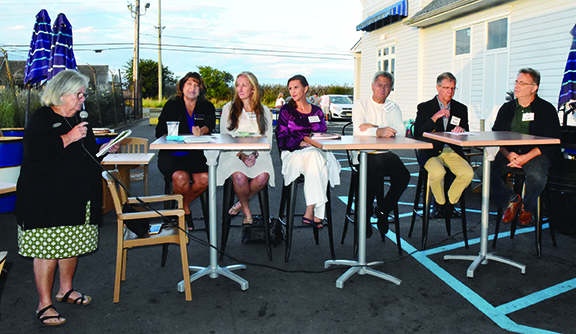Panel discussion: Add some pot to your tourism-related businesses
GALLOWAY TOWNSHIP — If you are in a tourism-related business, you may want to add cannabis to the equation such as yoga and cannabis or event pot and painting.
The Greater Atlantic City Chamber of Commerce and the Cannabis and Hemp Research Institute at Stockton University held a panel discussion March 15 called “Destination Cannabis, Opportunities for New Jersey Hospitality and Tourism.”
Jane Bokunewicz, faculty director of the Lloyd D. Levenson Institute of Gaming, Hospitality and Tourism at Stockton University School of Business, said development of a recreational cannabis industry in New Jersey will have significant benefits on the state’s existing businesses and will create new and unique opportunities for hospitality and tourism.
Panel member Robert Meija, an adjunct professor in Stockton’s Cannabis Studies Department, said if a municipality allows it, a dispensary may also have a consumption lounge on the premises. The state has 560 municipalities but only nine currently permit consumption lounges, he said.
Brian Applegarth, founder of the Cannabis Travel Association International, said there is a “canna-curious audience, the cannabis wellness traveler as well as the cannabis enthusiast traveler.” California has a pending bill to allow cannabis catering for events such as weddings and conferences. He said the California State Fair was incorporating cannabis into its awards program.
Susan Dupej, a social sciences and humanities research postdoctoral fellow in Ontario, Canada, who studies cannabis tourism, said partnerships are key to success.
“Dispensaries are great. That’s where the tourists can access the cannabis, but what is that paired with?” she asked. “The tourism aspect comes in with respect to the experience around it.”
She suggested tours of cannabis farms such as those held at wineries.
Applegarth said there is a stigma about cannabis travel.
“When I think of cannabis travel, I almost equate it with when LGBTQ travel started surfacing and had to have their safe travel book in the 1970s,” he said. “This also existed for the African American community with the Green Book.”
Partners such as hotels, airports, attractions, restaurants and art exhibits are pairing with cannabis in California, Applegarth said.
“As wine pairs with food, cannabis pairs with environments or activities and experiences, and what the science is showing is that specific cultivars are actually kind of targeted sensory enhancement precursors to the set and setting or the environment that you are walking into,” he said. “Some of them are inspiring and agree with art, some of them are appetite-stimulating and great with a meal.”
Tourism partners need to understand there are many other methods of cannabis ingestion above and beyond inhalation, Applegarth said.
Meija said a lot of cannabis hospitality and tourism is entrepreneurship. He said a company could be set up with many partnerships to pick up the “canna-curious” at the airport, educate the passenger on what they can and cannot do in New Jersey, take them to a dispensary to get products and then to a consumption lounge.
He said Atlantic City is allowing consumption lounges and that tours of cultivation centers, processing or edible production facilities could be offered.
“You can go further and take them to events where you can offer food and beverages that’s infused,” he said.
Meija said fast-acting edibles can be made that take effect in 20 minutes or less, which may become the standard in the beverage market. New Jersey’s edible program at this time is limited to syrups, lozenges and gummies.
“If I’m in New Jersey now, I’d give some thought as to what you can do as an entrepreneur that you are already doing,” he said. “If you are a yoga instructor, can you add a couple of sessions of yoga and cannabis? If you are a painter, how about doing a puff-puff paint? What about doing an event that you can teach people how to roll a joint and roll sushi?”
“If you make bouquets, why not put some cannabis leaves in there,” Meija continued.
Applegarth said he believes hemp and cannabis will widen the definition of wellness. He said if something has gone awry in the body, the cannabis plant works on a biological level to recalibrate and bring a person back into homeostasis or back into balance.
Cannabis and spas would be a good pairing, Applegarth said.
“There’s over 400 to 500 compounds in cannabis and it’s an incredibly evolving, complex plant. There’s new frontier here for whatever you’re passionate about,” he said.
Jamie Hoffman, an edibles processor from Seattle, Wash., said hers is one of the only edible companies that is Kosher-certified.
Hoffman advised new cannabis entrepreneurs to go slowly, build a solid foundation and assemble a good team of people.
Dupej said an entrepreneur in cannabis tourism does not necessarily have to be a cannabis consumer. She advised entrepreneurs to be open and transparent with local government.
By JACK FICHTER/Sentinel staff

